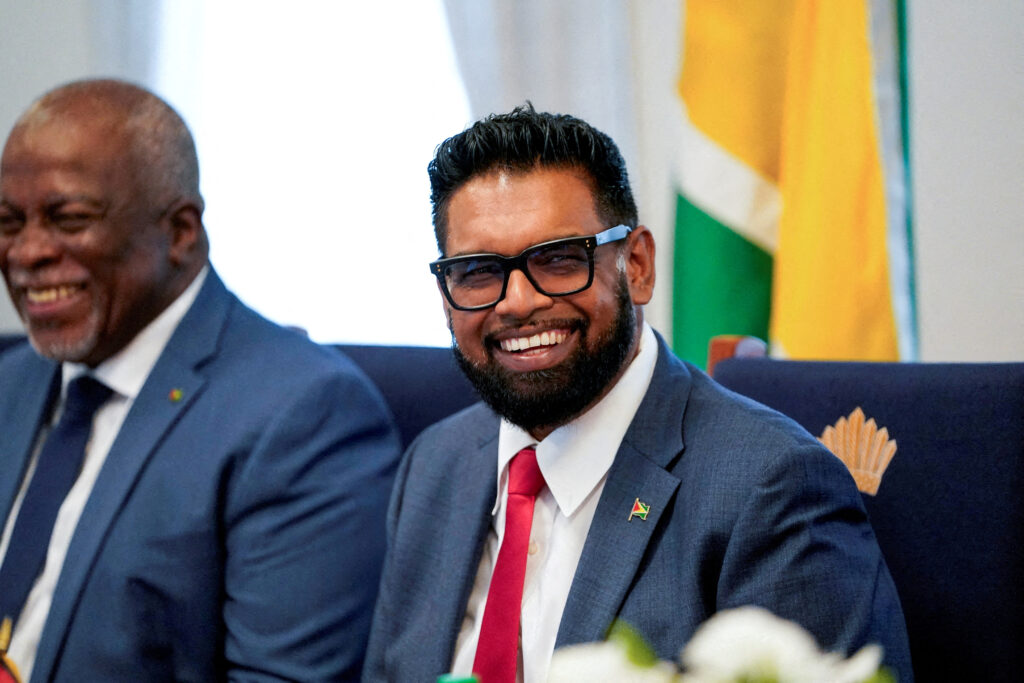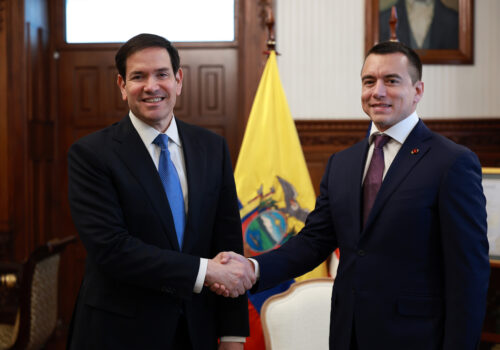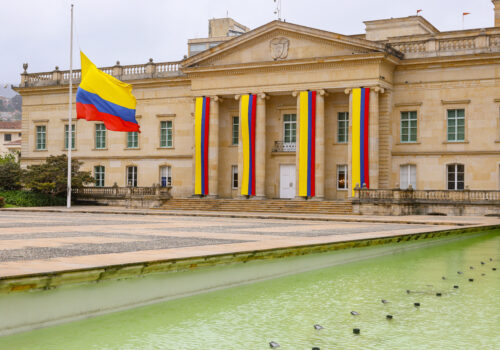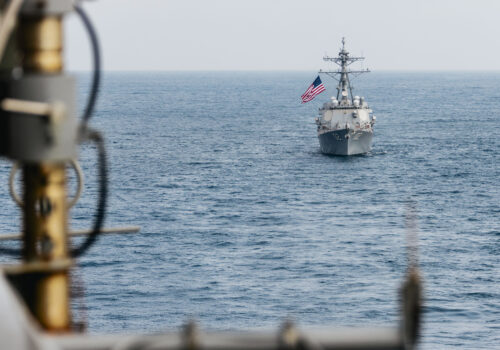On Sunday, Guyanese President Irfaan Ali was sworn in for a second term leading a country with one of the fastest-growing economies in the world. “The next five years will be the most consequential in our nation,” Ali said in a speech after being sworn in, adding that he would use his second term to “build more prosperity in every family and every home.”
The country overall has experienced a leap in prosperity in recent years. Between 2022 and 2024, Guyana’s economy grew at the mind-boggling rate of 46.9 percent on average per year, according to the International Monetary Fund. The country’s recent surge of economic growth is built on the back of the government’s management of Guyana’s oil resources and investment in nonenergy sectors, such as health, agriculture, construction, and hospitality. With the increased revenues from oil, Ali’s government has begun an overhaul of the country’s infrastructure, such as the soon-to-be-completed Demerara Harbour Bridge and the Eccles to Ogle Highway. Now, with five more years in office, Ali is likely to shift his approach to include a new phase of Guyana’s development, one primarily focused on building a resilient economy. Even with a booming economy, however, there will be challenges, from potential Venezuelan aggression to the need to take ownership as a growing regional leader in the Caribbean.
In speeches during the recent election campaign, Ali stressed that he would focus on three areas in a second term: (1) investing in human capital and tools for wealth creation for the average Guyanese; (2) capitalizing on natural gas resources to build out new industries, such as petrochemicals and data centers; and (3) continue investing and scaling nonenergy economic sectors.
All three of these areas align with Ali’s intent to ensure that the DNA of Guyana’s economy is innately resilient to the ebbs and flows of global markets while continuing to protect the country from the pitfalls that lead to the so-called “resource curse.” Building skills at home fosters entrepreneurship and small business growth while developing the petrochemical sector can help bring new jobs and manufacturing capabilities. Finally, nonenergy investment decreases economic vulnerabilities by making government revenues less dependent on oil and gas resources.
Fortunately, this time around, Ali’s government has more tools at its disposal.
First, Guyana’s foreign investment portfolio is growing. Major international companies across the energy, construction, health, and hospitality sectors have made significant investments in the past five years with substantial success. This should help de-risk concerns for international companies that are currently on the fence about investing in a country that is still a small market with an open-facing economy compared to its neighbors in Latin America.
Second, Guyana’s local private sector has matured quickly in a short period, now on track to compete with international firms that are bidding on infrastructure projects and the development of new financial instruments.
Third, Ali’s administration can capitalize on five years’ worth of diplomatic relationship-building with the United States, the United Kingdom, India, and countries in Africa. These states—whose leaders share strong ties with Ali—are likely to further encourage companies in their countries to accelerate the exploration of investment opportunities in Guyana.
Despite the bright road ahead, challenges still await Ali and his government.
Venezuela is the most immediate threat. Persistent saber-rattling from Venezuela’s autocratic leader Nicolás Maduro—in the form of naval incursions and encroachment on the land border with Guyana—is expected to continue and perhaps even intensify over the next few years. To date, Ali has worked within international institutions, such as the International Court of Justice (ICJ), as well as with allies such as the United States, to contain the threat. Going forward, Ali may need to flex his diplomatic muscles, as flashpoints in the border controversy are likely to arise following next year’s ICJ ruling on the validity of the 1899 Arbitral Award, which settled the country’s border with Venezuela. If the ruling is unfavorable for Venezuela, then Ali may be required to again engage with Guyana’s international allies and regional neighbors to contain potential aggressive tactics from the Maduro regime.
Ali will also likely need to take on more responsibility as a Caribbean leader. Guyana already leads the region in its efforts to decrease the overall food import bill, but with the country’s wealth and international profile growing, Caribbean allies will look to Ali to play both mediator and anchor on a variety of issues. For example, the Caribbean’s response to the US naval deployment in the Southern Caribbean focused on counternarcotics operations will likely continue to come through Guyana, given the country’s proximity to the vessels and its border controversy with Venezuela. This could place Guyana at a friction point between the Trump administration and Caribbean leaders that call for the region to remain a “zone of peace.”
Even with these challenges, Guyana’s economy is on track to continue its rapid growth. The country’s next step is to bring the benefits of this growth to all the Guyanese people, including by making people and their skills the backbone of the economy. Moreover, the government will need to do this while navigating the regional and global responsibilities that have been cast Guyana’s way. If Ali can manage all these variables, then Guyana might see its next phase of growth as one that continues beyond the next five years and into the next few decades.
Wazim Mowla is the fellow and lead of the Caribbean Initiative at the Atlantic Council’s Adrienne Arsht Latin America Center.
Further reading
Fri, Sep 5, 2025
Rubio’s visit to Mexico and Ecuador shows the need for US security cooperation runs deeper than warships in the Caribbean
New Atlanticist By María Fernanda Bozmoski
US counternarcotics operations in the Caribbean are only one aspect of how Washington can build security ties with Latin American partners.
Tue, Sep 2, 2025
Dispatch from Bogotá: This September is a pivotal moment for US-Colombia relations
New Atlanticist By Geoff Ramsey, Isabella Palacios
In the coming days, the White House has to decide whether to certify Colombia as a partner in the fight against transnational drug trafficking.
Fri, Aug 29, 2025
Why are US warships heading toward Venezuela?
New Atlanticist By
Three Aegis guided-missile destroyers and several other US warships are headed to the waters near Venezuela. Two Atlantic Council experts explain why and what to expect next.
Image: Guyanese President Mohamed Irfaan Ali attends a meeting with U.S. Secretary of State Marco Rubio (not pictured), in Georgetown, Guyana, March 27, 2025. REUTERS/Nathan Howard/Pool//File Photo




